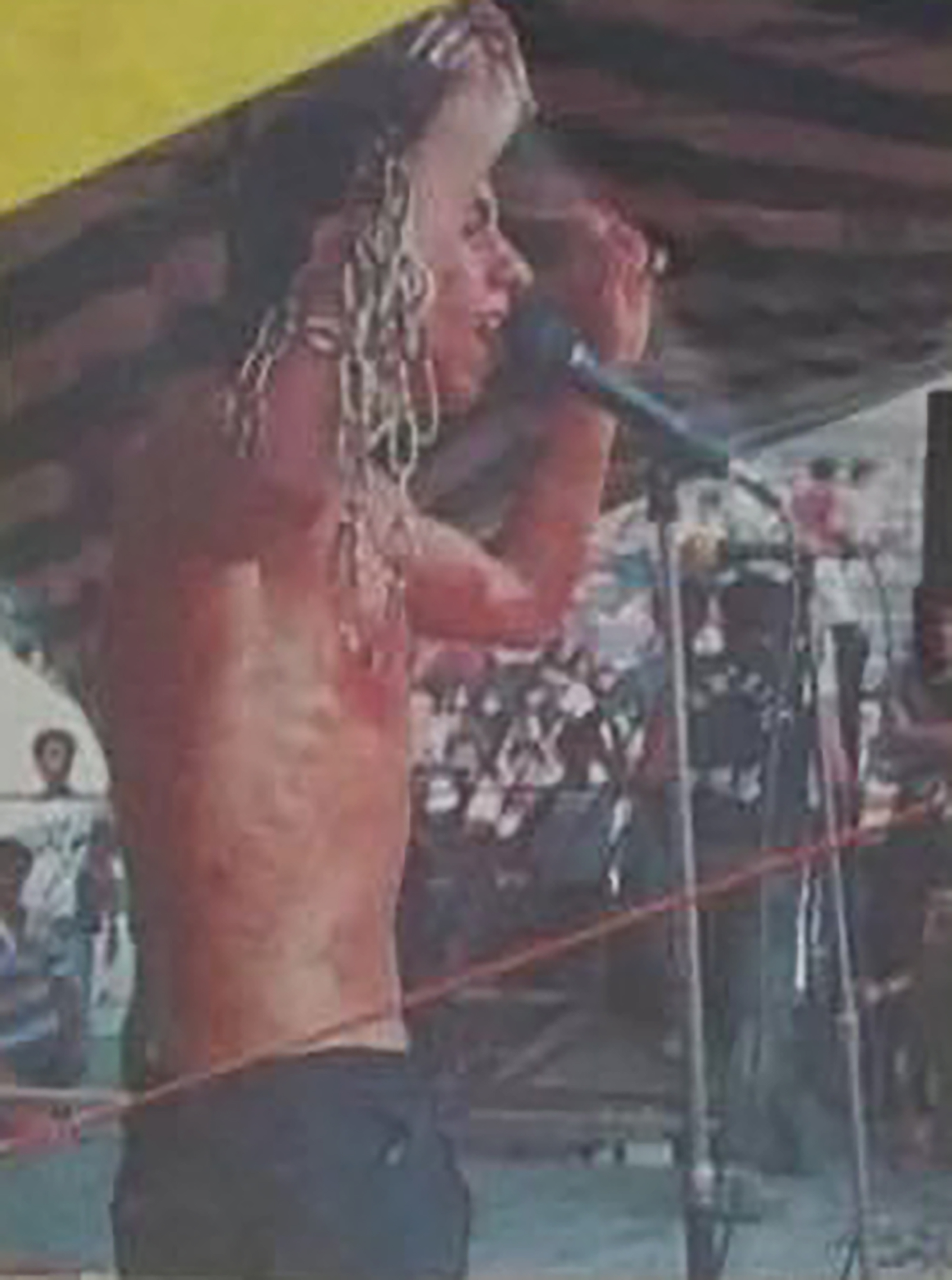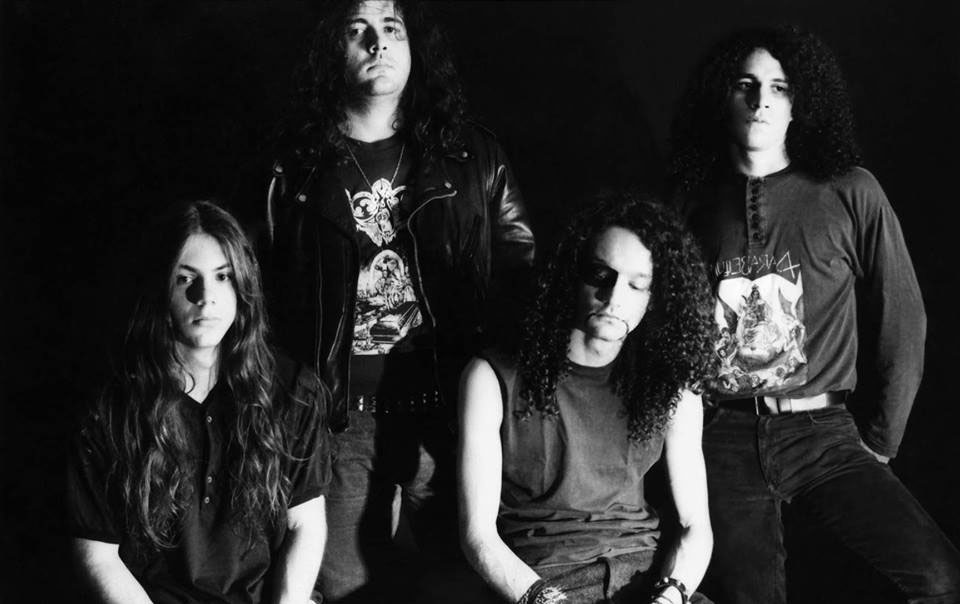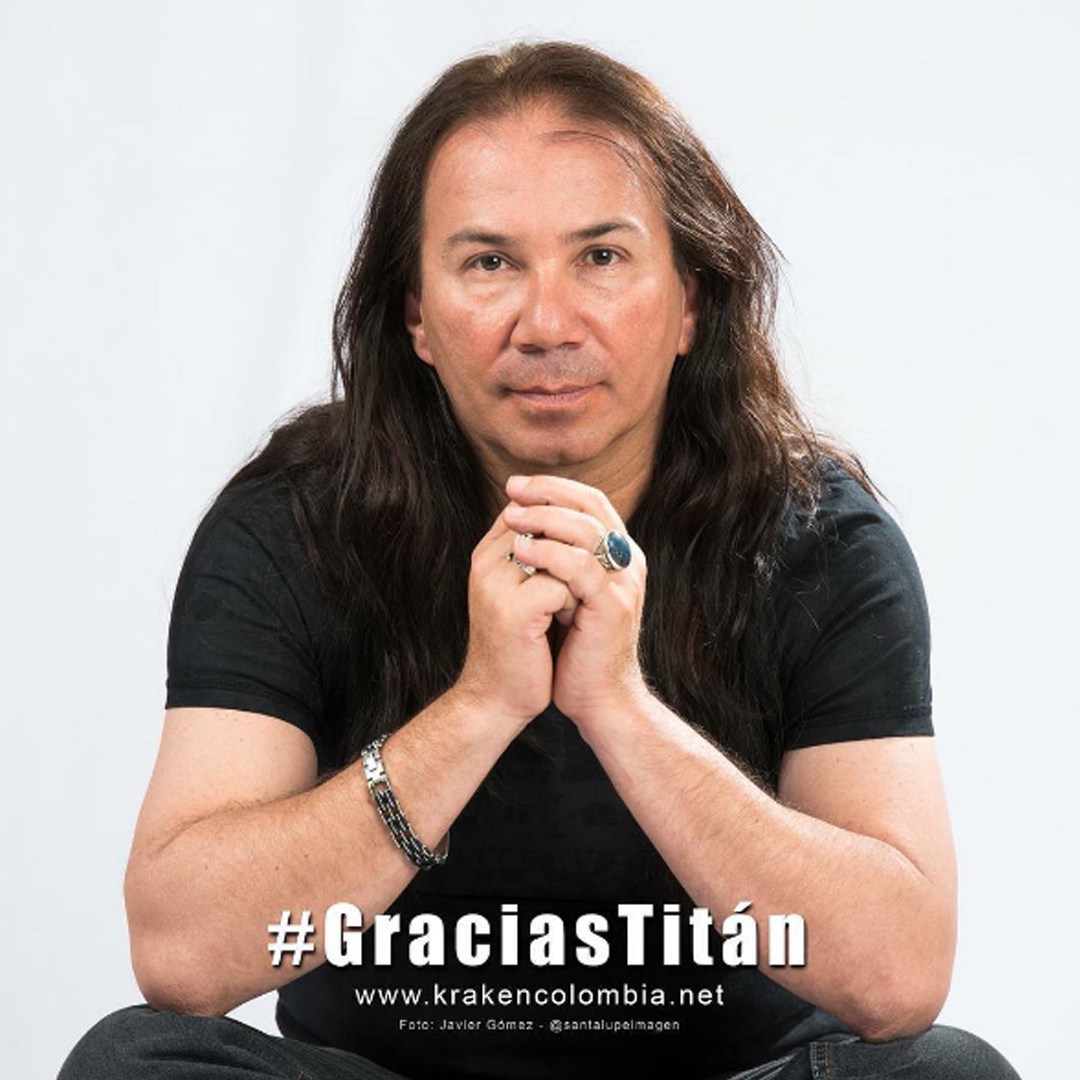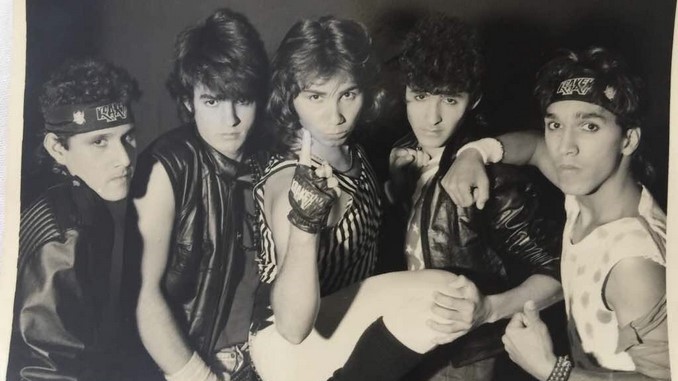Medellín, Colombia. You may know it for cocaine, Pablo Escobar, or drug cartels, but bring it up any of that with the locals, and you’re likely to piss them off. Unsurprisingly, nobody in Medellín is fond of the TV series Narcos or the villain that put them in the headlines. Three decades of violent dispatches, terror documentaries, and drug tourists have plunged the city into an uphill battle to reclaim its cultural history, with the latest blow coming from Russian network RT and their documentary Escobar’s Hitman. Whether Colombians want to talk about it or not, though, the legacy of Escobar is inescapable. During the terror of the late 1980s, the capital of the northern province of Antioquia was known best as world’s murder capital… but it was also the capital of Colombian rock, punk and heavy metal, the scene of a cultural revolution caught in a maelstrom of violence.
This year, the city mourned the loss of Elkin Ramírez Zapata, its first rock superstar. After losing his battle with brain cancer, Ramírez passed away on January 29th, 2017. Known as El Titán, he was widely regarded as the Colombian answer to Iron Maiden’s Bruce Dickinson. His funeral brought Medellín to a standstill, and for the first time in its history, the city’s Metropolitan Cathedral was packed with metalheads and punks—fans, friends and well-wishers who shed tears and sang together as his band Kraken performed their final concert. In the early 1980s, Ramírez and Kraken were at the pinnacle of his country’s rock revolution, a singer whose screaming falsettos and quiet perseverance would indirectly put Colombia on the musical map.
Videos by VICE
“He was such an amazing person and his loss has hit us very hard.” said Alex Oquendo, frontman of Masacre, another Colombian titan. “He was like the father of all rock people here and the first to perform heavy metal in Spanish. Modern Colombia has lost a poet and someone who fought hard for rockers, South American people, and the rights and freedoms of man. Every day people continue to express the loss that his death means to the city and the country. There is even talk in the city of putting up a statue or a monument to him. There needs to be a big commemoration to preserve his memory.”
Every man is a story,” wrote Ramírez in 1986, and his is a tale of two cities. As depicted by Victor Gaviria in his 1990 film Rodrigo D: No Futuro, the death and nihilism wrought by Escobar would have an unintended byproduct—a counter-culture born of Western music. Unlike any insurgency in Colombian history, it would be a movement armed with rock, punk and heavy metal. Its soldiers would be the disaffected youths of the city’s neighborhoods and hillside slums, and as they suffered through the madness, they would turn their weapons on society.
One of these was Juan Aristizábal Vásquez (aka Juanes), now one of the biggest-selling Latin artists in the world.. Along with Shakira, Juanes would become one of Colombia’s first global pop stars and bring the nation’s struggle into the mainstream. In a career spanning just 17 years, he was named by Time Magazine as one of the world’s 100 most influential people, won 22 Grammy Awards and performed in front of the United Nations. Unlike Kraken’s, his music is so popular that you’ve probably even heard it. “My connection with Kraken’s music started in 1986 when I was 14 years old,” he says. “By then, they had published their first 45 Rev LP containing Todo hombre es una historia and Muere Libre, two songs that marked the course of my life and the beginning of a musical movement in Medellín, which at the time was in the midst of a violent war between the state and the mafia. The strength and artistic qualities in Elkin Ramírez and those who accompanied him from the beginning, will always be a source of inspiration for me and many of my generation.”
Both Oquendo and Juanes, who shared the band Ekhymosis, would later bring Colombia international fame: Juanes as an acclaimed international pop artist and peace envoy, and Oquendo as the frontman of a visceral death metal band called Masacre—the first Colombians to sign to a major foreign label. Influenced by El Titán, they would use their lyrics to condemn the violence of their days. Here’s how it happened…
In the late 1960s, British rock music swept through the Latin world. The revolution that started with The Beatles and The Rolling Stones went into overdrive with Black Sabbath, Deep Purple and Led Zeppelin, and as Spain languished under the censorship of General Franco, Argentina carried the baton. Rock Nacional, a genre built on rock music and pride in the Spanish language ,was born, causing a chain reaction in Latin America. By the early 80s, Franco was dead and Rock Radical Vasco, protest music from the Basque country, had arrived in Colombia through record importers, along with American hard rock and hardcore punk.
The youth of Medellín developed an insatiable hunger for these sounds, fueled by informal gatherings called notas or parches where fans traded tapes, knowledge and pastas [LPs] if they were lucky enough to own them. Local bands began to form, playing at house parties and parqueaderos (parking lots). Though some credit can be given to Jorge Calderon and his band Carbure, the nation’s first ‘real’ rock band, history would be made on the September 22, 1984 ,when a band called Kraken (formerly Kripzy) played a concert in a violent neighborhood.
“I first saw Kraken live at the Teatro Lux in Manrique, a comuna here in Medellín that has always been plagued with social issues,” remembers Oquendo. “The ticket was 200 pesos, which I think is barely even one US dollar today. We were in awe, and watching a vocalist like Elkin was like having our own Bruce Dickinson. He was a singer with an outstanding quality of voice and the guitarists could match Iron Maiden’s in their heyday. It felt incredible.”
But it wasn’t all brotherhood. Just like Britain in the 1970s, rock, punk and metal had come to Medellín as working class movements, and they were jealously guarded. Whereas “ghetto” bands like Mierda, Parabellum, and Danger were comparatively crude, Kraken was refined, complex and poetic. They were also from Belén, a middle-classed neighborhood far from the troubles of Manrique, Aranjuez, and Buenos Aires in the gang-ridden outer districts. The early movements in Colombia were heavily divided along socio-political lines, and soon turned volatile with the emergence of ultra metal—a primitive fusion of metal and hardcore punk, radically opposed to commercial music, the establishment, and anyone who sounded weaker.
“The view then was that metal was only for the working classes,” says Roman Gonzalez of the band Sargatanas (also from Belén). “The rich and the middle classes didn’t deserve listen to it. If you were a rich metalhead, you were a fucking casposo [“dandruff;” slang for poser]. Elkin was handsome and rich, but he was also a hard-working guy, a visionary who broke all the rules to play music at a professional level. People in Medellín at that time couldn’t understand it—they were kind of like cavemen.”
These class differences would erupt into violence at a concert in 1985, now considered one of the most important events in the city’s musical history…
Some people claim that Pablo Escobar was a rocker. At the height of his power, he was alleged to have flown The Rolling Stones, REO Speedwagon, and Samantha Fox to perform at his mansion, but there’s no real evidence to prove it. In parallel to his criminal activities, he also played the philanthropist, donating large amounts of money to the city. One of his charities, Medellín sin Tugurios [Medellín without Slums] was a regular sponsor of public events, and in 1983 it backed record importer Raúl Velásquez of JIV Ltd to put on the city’s first major rock concert, performed by Tampa heavy metal band Argus at La Plaza del Toros La Macarena.
La Macarena was a 15,000 capacity bullfighting arena, and on March 23, 1985, it became the scene of a full-blown riot. Spurred on by the success of Argus, JIV Ltd and Radio Veracruz organized a battle of the bands, billing local bands Spool, Glöstter Gladiattor, Danger, Mierda, Excalibur, Parabellum (billed as Mentes Locas), Lasser, and Kraken to compete for a deal with national record label Codiscos. It was a massive undertaking in the tradition of American stadium rock.
As the concert began, things got off to a shaky start for soft-rockers Spool. Withering in the 90 degree heat, their commercial rock ballads went down like a lead balloon and their set turned into target practice. The crowd threw stones and clusters of sand from the bullpit, chanting Caspa! Caspa! [Poser!] and the band were forced to abandon their set. The following acts Glöstter Gladiattor and Danger would struggle to keep things civil, but somehow managed to regain the crowd—Glöstter Gladiattor with sheer charisma, and Danger with their humble roots. True to their name, ultra metal band Mierda began to stir shit as their vocalist Oswaldo Ordoñez Carmona covered himself in blood and baited the audience, hurling anti-Christian slogans and commanding them to “leave nothing standing.” “Crucify me!” he shouted, followed by, “Satan is among us!”

Mierda
The atmosphere became tense and the promoters called for an unscheduled break. Unlike the usual disorder, the gathering they’d put together was in fact a social time bomb, waiting to go off. Drawn from the poorer neighborhoods, the punk/metal crowd were a radical force that detested their middle-class rocker cousins. Even their location was a metaphor, as the diehards writhed in the dirt of the pit and casual rockers looked down on them from the stands.
The concert resumed with the stoning of heavy metal band Excalibur, whose only sin was that they didn’t play ultra metal. They were soon drowned out with chants of “Parabellum! Parabellum!” [Latin: “prepare for war”]. In this perverse Roman re-enactment, the mob were calling on a band from the Buenos Aires neighborhood, one of the most radical groups of their time. Parabellum’s violent sound became a literal call to arms, and their set, made up of songs like “Guerra”, “Monopolio y Sexo,” and “666 Engendro” [666 Spawn] were a catalyst for the riot. What began as a Battle of the bands was now a battle of the fans.
The moments before the violence are captured in the video below:
The stones that pelted Excalibur and Spool were turned towards the stands, and a man seen “dancing like a homosexual” during Lasser’s set became the straw that broke the camel’s back. Class war and sectarian violence erupted as an all-out brawl between punks, metalheads, and rockers ensued. Police dispatched to the scene were hopelessly unequipped for the riot, and called in the fire department, who turned the arena into a public bath. “Scandalous,” wrote a journalist in local newspaper El Espectador, comparing the event to an “orgy” of drug users who he berated for trashing the venue’s newly renovated bathrooms. The battle was over, and headliners Kraken would never perform. Sat backstage, their young frontman, Elkin Ramírez was said to have been placid and undeterred. It was a unique characteristic that would follow him through his life.
Ramón Restrepo, who fronted Parabellum that day remembers: “We knew well of the radicalism in music. The underground metalero resisted against commercial music in that battle of bands and The Vase of Llorente [an event that began Colombian independence] burst against bands that did not sound as heavy as Parabellum. As Carlos Mario “La Bruja” (guitarist) said, “For Parabellum I didn’t push the situation, we just played our music. Elkin knew how to get ahead of those tests. The differences are given in natural diversity and in the end they teach about the power of the union in separation, which is a requirement of life itself. I think of him as a poet and a warrior. As a gentleman and cultured man, a special voice in his genre. If you don’t like something, then don’t be part of it—but with respect, as he did.”
The battle was inconclusive, but Kraken had won without a playing a note. One of the organizers, Carlos Acosta became their new manager and got them a record deal with Codiscos in 1986. The band released a pair of two-track EPs, followed by their legendary debut, Kraken, in 1987. For the of rest of Medellín, a riot at a concert would soon be the least of their problems. The paper that reported it would have its offices bombed and burned to the ground.
“Unfortunately in the late 1980s, the drug war began,” wrote Mario Aponte of the band Maleficarum in his own account of the times. “Many warriors moved away from music out of economic necessity and joined forces with the sicarios [hitmen]. Many that I knew were killed and many died accidentally by getting too close to the car bombs. This was not an obstacle for us to go to the parches and concerts that were generally in the violent neighborhoods. We were not afraid of anything and maybe that was the magic that infused the music—that power of not fearing anyone or anything. The sicarios and hitmen in many of these neighborhoods attacked us, but we didn’t pay them any attention and carried on. And so we reached the nineties…”
In the period between 1985 – 1993, Colombia went to hell and back. ’85 saw an unprecedented attack in the capital Bogotá, where 35 armed guerillas from the group M-19 stormed the country’s Palace of Justice, killing over a hundred hostages and 11 of the country’s 21 supreme court justices. In Medellín, Pablo Escobar began to murder and bomb his opponents relentlessly, employing teenage sicarios and professional killers to do his bidding. As the government threatened to extradite him to the United States, he targeted police, politicians, and journalists ,and by 1989 the city had become a literal mafia state. Presidential candidate Luis Carlos Galán was murdered, and an attempt on the life of another politician ended in the bombing of Avianca flight 203. Adding to the misery, the Cali Cartel from Colombia’s Valle del Cauca began a power-struggle with Escobar in a bid for control of the cocaine trade.
Violence in Colombia did nothing to deter its musical growth. The movement that started in Medellín now doubled in size, adding names like Masacre, Astaroth, Nekromantie, Blasfemia, and Reencarnación. New bands formed in the rest of the country: Neurosis, Darkness, and La Pestilencia in Bogotá, along with Krönös and Inquisition in Cali. Other parts of the country followed, spurred on by a surge in concerts and youth metal radio stations like La Cortina Hierro [The Iron Curtain, hosted by Mauricio “Bull Metal” Montoya] which had audiences in the hundreds of thousands. By 1990, Colombian metal was a force to be reckoned with and those who created it had nothing to lose. Kraken had broke out of the underground and after being attacked by punks at Medellín’s Carlos Vieco Amphitheater in 1987, they took their music on the road.

Masacre
Víctor Raúl Jaramillo aka “Piolin” of ultra metal band Reencarnación recalls the differences between his wave and the Kraken sound: “Man, I only knew three Kraken songs, and I’ve never had a dialogue with Elkin that can be called satisfactory. Elkin and I were not properly compatible ,but I emphasize his work, his constancy, and untiring struggle to bring Kraken’s music as far as he could. When the work of men surpasses, we are before a genuine creation.”
Colombia’s hopes were dashed in August 1989 with the assassination of liberal politician Luis Carlos Galán in front of 10,000 people at a rally in Soacha, a suburb of Bogotá. Galán had declared war on the country’s drug cartels, who knew they’d be finished if he was elected. In one of the most dramatic public killings of the 20th Century, Galán was shot as he walked onstage, surrounded by supporters. 24 hours after the murder, Kraken played a concert in his honor. Ramírez called for a minute of silence, in the name of “peace, respect, and liberty” as he stood onstage. The concert was at La Plaza del Toros La Macarena, the same venue that had denied them four years earlier.
Three months later, the band released their sophomore album, Kraken II. It was a work of virtuoso hard rock; musically, they were worlds ahead of their peers. Their sound became more complex, progressive and laden with keyboards, akin to a Latin Queensrÿche. Their song “Vestido de Cristal” became the topic of furious debate on the nation’s youth radio stations, but even as they ascended to national stardom and performed to 20,000 people in Venezuela’s Poliedro arena in 1990, nobody could accuse them of arrogance.
“Elkin was a gentleman—not a rockstar or a scenester. He wasn’t egotistical.” says Andrés Castro, a promoter from Bogotá. “He represented hope and Kraken were well respected. In those days being a metalhead was not like it is today and his message was ‘Don’t worry. You’ll make it’.”
It would be at least another decade before the age of narco-terrorism came to an end. By 2012, many of the country’s major drug lords had been killed or imprisoned, and Colombia is on now on the long road towards peace. Cocaine is more or less shunned by today’s metal scene and the drug cartels are a source of shame and national disgust. The mere mention of Escobar’s name is enough to make most Colombians furious.
David Rivera, guitarist of Tenebrarum, puts this into perspective: “I have to say this… Pablo Escobar was a disgrace for us as a society. He’s not a popular hero or anything like it—he was a fucking criminal. I think a lot of people here take advantage of this part of Colombian history to sell a little more. Obviously metal history in Medellín was touched by violence, but everybody was affected, not just the metal scene. We can’t talk about the development of metal with Pablo Escobar at the center of it.”
“South American” metal attracted huge of numbers of fans in the global underground between 1985-1993. Even western musicians, like Øystein “Euronymous” Aarseth of black metal band Mayhem were naturally drawn to the authentic and brutal-sounding Colombian bands. However “evil” the pioneers of Norwegian black metal claimed to be, they were ultimately just middle-class teens lighting fires in a Scandinavian utopia. Their so-called evil paled in comparison with the everyday realities of Colombia, which produced a sound and lyrical approach that couldn’t be faked or imagined. The band Masacre, well known for morbid, evocative titles like Colombia: Imperio del Terror [Colombia, Empire of Terror], Cáncer de Nuestros Días [Cancer of our days] and Ola de Violencia [Wave of Violence] are a gritty reflection of their times.
During the late 1980s, Euronymous began to correspond with Masacre drummer Mauricio “Bull Metal” Montoya to spread music and sign bands to his label, Deathlike Silence Productions. Some have even suggested that Euronymous’s discovery of Parabellum, the fathers of ultra metal, had a direct influence on Mayhem and the rise of Norwegian black metal. Whether or not this is true, Masacre would be the first Colombian band to break out of the country and in 1991, they released their debut album Reqviem through French label, Osmose Productions. Even if their sound was radically different, their frontman openly admits his debt to Kraken.
“They influenced Masacre and everybody else,” says Alex Oquendo. “The lyrics were, like I said, very interesting—a poetic style of writing that narrated many of the things we experience in South America and particularly in Colombia. I was also good friends with Elkin and we spoke about a lot about these things. He was very interested in everything that was going on in the country, in its social and political issues and he championed all these things. These are very hard days,” he adds: “Every morning I wake up and the first thing I think about is Elkin. We spoke every day, and he would send me these WhatsApp audio messages. I keep re-playing them, and my wife keeps telling me it’d be better if I stopped… but it’s very hard for me not to be able to hear his voice anymore.”
Like the writing of Colombia’s national poet, Gabriel Garcia Marquez, the lyrics of Elkin Ramírez were entrenched in magical realism, littered with dreamlike metaphors and double-meanings. His eloquent language speaks of social ills, corruption, guerillas, and the plight of indigenous peoples. His attacks were subtle, poetic and rarely direct.
“Elkin read a lot, which also influenced his lyrics,” remembers Kraken guitarist Hugo Restrepo, who now runs a music school called Solo Rock. “He was a kind, receptive person who never had anything negative to say about others. He faced his problems and overcame them with strength of character.”

Medellín today is a different picture. It’s not perfect, but it’s a far cry from the 1980s. Kraken’s music still blares from the parches and bars frequented by the city’s many metalero,s and those who once threw stones now claim to revere the sound of “true” heavy metal. The band’s influence can also be found in Colombian musicians abroad. Drummer Mauricio Chamucero, of British heavy metal band Rogue Male, is one of them. “Elkin had a dream in a country where it was almost impossible to make your dreams come true at the time,” he says. “While I left my country and everything behind in order to make that dream come true, Elkin decided to stay and fight for it. He showed us all that anything is possible regardless where you’re from.”
Jaime Gomez Arellano, now one of the biggest producers in extreme music, is another. “I think everyone in the Colombian scene regarded Kraken as one of the best bands in the country, and I’ll never forget the impact that they had,” he says.
As Colombia soldiers on towards peace and prosperity, Elkin Ramírez leaves behind a better world. He is survived by his son, Andrés, and his music continues to inspire many of his countrymen to follow their dreams, whatever the odds. Rock, punk, and heavy metal are still some of Colombia’s most popular genres, and he still has fans in the highest places. One of them even took time to write to his family after his passing.
“I deeply regret the departure of your son, Elkin Ramirez, a pioneer of Rock Nacional and a prominent member of the cultural heritage of our country. His work of more than three decades was fundamental, no doubt, to expand the borders of our music and leave an indelible mark on several generations of Colombians who grew up with Kraken. We remember him as the great interpreter and composer that he was but, above all, for the example of independence and honesty he gave throughout his life. Although his voice is no longer with us, the legacy of the rock Titan will accompany us forever.”
The statement came from Juan Manuel Santos, President of the Republic of Colombia.
More
From VICE
-

Moussa81/Getty Images -

Screenshot: FuturLab -

-

